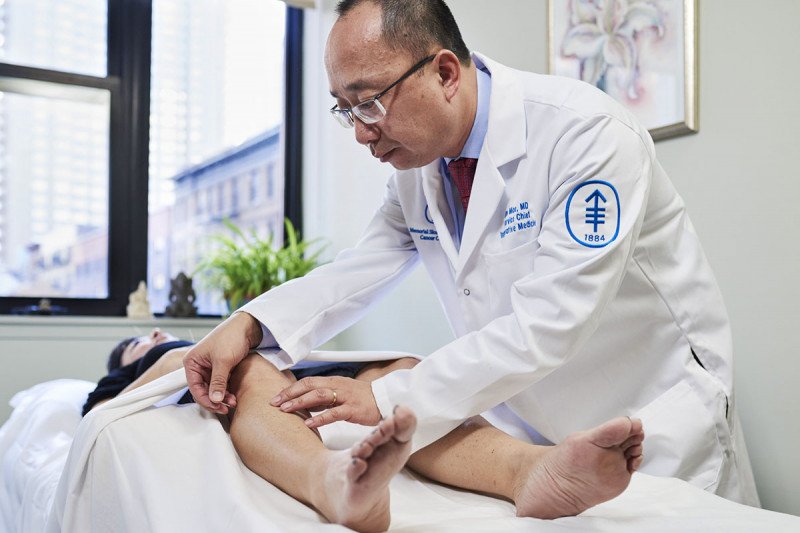
 i_need_contribute
i_need_contribute

“A lot of previous acupuncture studies focused on women with breast cancer," says Jun Mao, MSK's Chief of the Integrative Medicine Service at MSK, shown here treating a patient in 2016. "Here, we included people with prostate cancer, lymphoma, and many other types of disease."
For people with a history of cancer, acupuncture is a drug-free option to help control and improve side effects from chemotherapy, radiation, and surgery. Studies have shown that acupuncture can help with pain, fatigue, insomnia, neuropathy, and nausea.
Electroacupuncture uses very small, thin needles — about the width of a hair — and a very low-frequency electric current to stimulate points on the body. It is different from other kinds of acupuncture that don’t use a current. Electroacupuncture is very customizable to each patient and the needles come out after each session. Auricular (ear) acupuncture uses little studs that look like tiny earrings to stimulate up to ten points in a patient’s ear. The points are the same for each person, and the needles stay in the person’s ear for three to four days.
Electroacupuncture takes many months or years to learn, but a provider can learn auricular acupuncture in one day. It’s much easier to implement and therefore can be more accessible to patients. For example, a community or rural hospital could start offering ear acupuncture before building out a larger acupuncture program.
We know that electroacupuncture can help reduce chronic pain. We wanted to test if ear acupuncture is as good. We split participants into three random groups: People who received electroacupuncture, people who received ear acupuncture, and people who received traditional care, which sometimes involved pain medication, including opioids and over-the-counter drugs. Acupuncture was done weekly for ten weeks. We followed each group for 12 weeks to see if the treatments worked. We checked in on them again 12 weeks later to see if the effects of their treatment lasted.
We found that both electroacupuncture and ear acupuncture significantly reduced people’s chronic pain compared to usual care with or without medication; however, ear acupuncture is not as effective as electroacupuncture. Compared with people receiving usual care, electroacupuncture reduced pain severity by 1.9 points and ear acupuncture by 1.6 points on a scale of 0 to 10. A one-point reduction in pain is clinically meaningful, so this is a pretty big drop. The pain relief of acupuncture lasts for months, which differs from pain medications, which must be taken frequently.
People could better tolerate electroacupuncture as well. Less than 1 percent of participants receiving electroacupuncture dropped out of treatment because of side effects from the treatment, which was most commonly bruising. Eleven percent of people receiving ear acupuncture dropped out of treatment, mostly because of ear pain.
"The pain relief of acupuncture lasts for months, which differs from pain medications, which must be taken frequently."
Jun J. Maointegrative medicine specialist
This is the largest trial of acupuncture for cancer survivors. We recruited patients from our Manhattan and regional sites and included a significant portion of minority patients. We also included people with different types of cancer. A lot of previous acupuncture studies focused on women with breast cancer. Here, we included people with prostate cancer, lymphoma, and many other types of disease.
I hope these results lead to more insurance coverage for cancer survivors receiving acupuncture. In 2020, Medicare started covering acupuncture for lower back pain. The acupuncture coverage for pain in cancer survivors, however, is inconsistent. And some cancer survivors have heart, kidney, or liver conditions due to treatment, which means they shouldn’t take too many pain relievers. Hopefully, these data will encourage healthcare regulators to expand coverage. The urgency is huge: People from lower socioeconomic statuses may not have the same access to acupuncture if it remains uncovered.